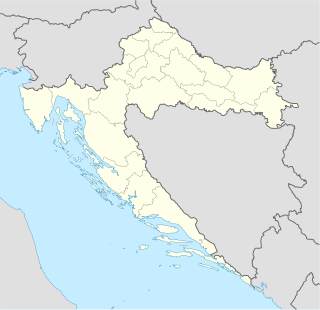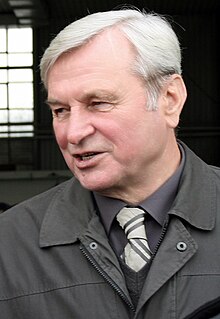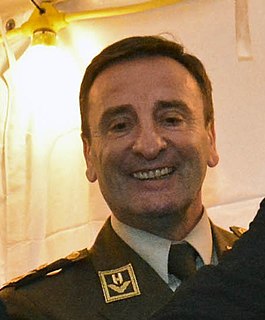
The president of Croatia, officially denoted as the President of the Republic of Croatia, is the head of state, commander-in-chief of the military and chief representative of the Republic of Croatia both within the country and abroad. The president is the holder of the highest office in Croatia. However, the president is not the head of the executive branch as Croatia has a parliamentary system in which the holder of the post of prime minister is the most powerful person within the country's constitutional framework and everyday politics.

The Battle of the Miljevci Plateau was a clash of the Croatian Army and forces of the Republic of Serbian Krajina (RSK), fought on 21–23 June 1992, during the Croatian War of Independence. The battle represented the culmination of a series of skirmishes between the HV and the RSK forces in Northern Dalmatia, after the implementation of the Vance plan and deployment of the United Nations Protection Force (UNPROFOR) began. The skirmishes occurred in the pink zones—areas under control of the RSK, but outside the UN Protected Areas established by the Vance plan.

The system of honours of the Republic of Croatia was established after the independence of Croatia in 1991. There are nineteen main decorations conferred since 2019, in addition to several other medals and awards.

The Croatian National Guard was an armed force established by Croatia in April and May 1991 during the Croatian War of Independence. Although it was established within the framework of the Ministry of the Interior for legal reasons, the ZNG was under the direct command of the Ministry of Defence. It was tasked with the protection of Croatia's borders and territory, and with tasks normally associated with police forces. The ZNG was formed with the transfer of special police units to the ZNG, establishing four all-professional brigades in May 1991, and was presented to the public in a military parade in Zagreb on 28 May. It was commanded by Defence Minister General Martin Špegelj before his resignation in early August. Špegelj was replaced by General Anton Tus, who became the first head of the General Staff of the Armed Forces of the Republic of Croatia.

The Homeland War Memorial is a Croatian state medal awarded to both Croatian and foreign citizens who participated in the nation's Croatian War of Independence as a volunteer, part of the Croatian Army and Croatian Council of Defence or in some other role.

The Grand Order of Queen Jelena, or more fully the Grand Order of Queen Jelena with Sash and Morning Star, is an order of the Republic of Croatia. It was established in 1995. It ranks second in the Croatian order of precedence after the Grand Order of King Tomislav.

The Grand Order of King Petar Krešimir IV, or more fully the Grand Order of King Petar Krešimir IV with sash and Morning Star, is an order of the Republic of Croatia. It ranks third in the Croatian order of precedence after the Grand Order of Queen Jelena. The next order in rank is the Grand Order of King Dmitar Zvonimir. The order had been established on June 20, 1992 and reconstituted on April 1, 1995.

Homeland's Gratitude Medal is the 19th most important medal in the Croatian honours system.

The Order of Petar Zrinski and Fran Krsto Frankopan is the 11th most important medal given by the Republic of Croatia. The order was founded on 1 April 1995. The medal is awarded with two versions of the Croatian interlace: the golden one posthumously for valor in combat, and the silver one for persons declared missing in the Croatian War of Independence. It is named after Petar Zrinski and Fran Krsto Frankopan.

Anton Tus is a retired Croatian general who served as head of the Yugoslav Air Force between 1985 and 1991 and was the first Chief of Staff of the Croatian Armed Forces from 1991 to 1992 during the Croatian War of Independence.

Zvonimir Červenko was a Croatian general and the chief of General Staff of the Armed Forces of the Republic of Croatia from 1995 to 1996.

Drago Lovrić is a Croatian general who served as a chief of General Staff of the Armed Forces of the Republic of Croatia.

Imra Agotić was a Croatian general who distinguished himself in the Croatian War of Independence.

Yuri Grigoryevich Khachaturov is a former Secretary-General of the Collective Security Treaty Organization (CSTO) and former Chief of the General Staff of the Armed Forces of Armenia.
The Zrinski Battalion was a special forces unit of the Croatian National Guard and later of the Croatian Army established in Kumrovec on 18 May 1991, during the Croatian War of Independence. The unit drew personnel from the special police forces and a former French Foreign Legion troops serving as its core. The battalion was set up and initially commanded by Ante Roso, while Major Miljenko Filipović took over as the commanding officer in August.

The 1st Croatian Guards Corps was a special formation of the Croatian Army directly subordinated to the Ministry of Defence rather than the General Staff of the Armed Forces of the Republic of Croatia and reporting directly to the President of Croatia. The corps was established in 1994 by the amalgamation of various HV special forces. The 2,500-strong unit was organised into the 1st Croatian Guards Brigade, a multi-purpose special forces combat unit, and four battalions tasked with ensuring the security of the President of Croatia and carrying out ceremonial duties. The HGZ took part in a number of military operations during the Croatian War of Independence and the Bosnian War. It was disbanded in 2000, when its components were amalgamated with other HV units to form the Special Operations Battalion, the 350th Military Intelligence Battalion, and the Honour Guard Battalion.

Mirko Šundov is a Croatian General who served as a Chief of General Staff of the Armed Forces of the Republic of Croatia from 2016 until 2020.
Andrija Andabak was a Croatian soldier who distinguished himself in the Croatian War of Independence.
The CroatianSpecial Operations Forces Command is one of the three independent commands of the Croatian Armed Forces, subordinate to the General Staff of the Armed Forces of the Republic of Croatia, whose mission is to ensure the combat readiness of the special operations forces for operations in defense of the territorial integrity, sovereignty and independence of the Republic of Croatia and to participate in NATO and coalition-led operations.

Predrag Stipanović is a Croatian rear admiral, since January 2018 serving as the Croatian Military Representative to NATO.


















